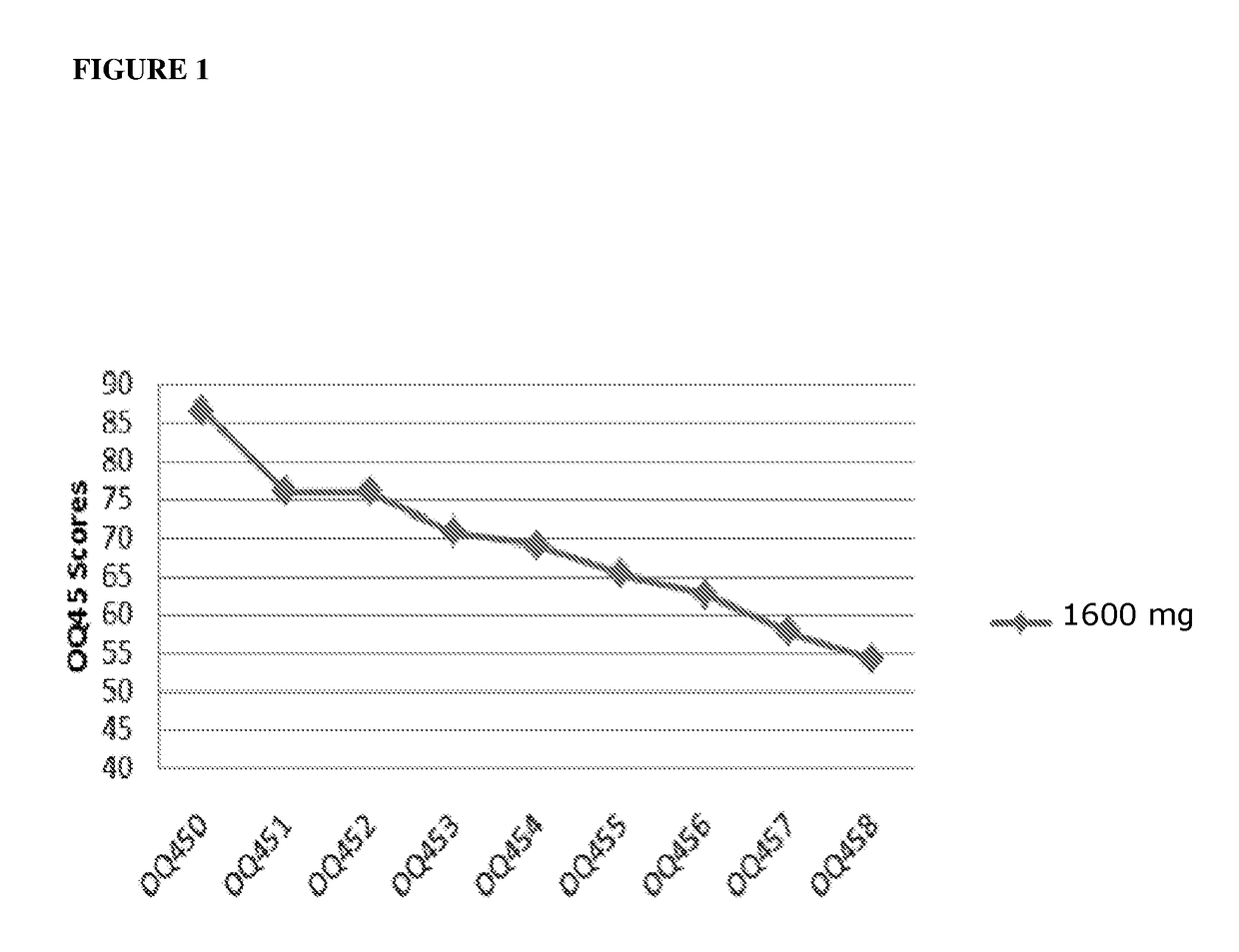Treatment for depression and depressive disorders
a depressive disorder and treatment technology, applied in the field of treatment of depression and depressive disorders, can solve the problems of increasing the risk of suicide and other chronic diseases, affecting social functioning and productivity, and affecting the quality of life of people,
- Summary
- Abstract
- Description
- Claims
- Application Information
AI Technical Summary
Benefits of technology
Problems solved by technology
Method used
Image
Examples
example 1
Magnesium Orotate in the Treatment of Depression
[0132]A pilot study of 8 subjects diagnosed with depression that did not adequately respond to prior treatment was conducted to investigate the effect of administration of 1600 mg per day magnesium orotate on depression over the course of eight weeks. The study received ethical approval from the Medical Research Ethics Committee (MREC) University of Queensland, Australia, within the guidelines of the National Statement on Ethical Conduct in Human Research. All participants provided written informed consent for the study.
[0133]The subjects were selected for inclusion in the study as follows. At the completion of a 15 week study investigating SAMe treatment of depression, suboptimal treatment responders (n=8) were inducted into the present orotate study after a 2 week wash out period. Sub-optimal treatment responders were defined as those still experiencing clinical depression by the SAMe study endpoint, which consisted of six participan...
example 2
Magnesium Orotate and Probiotics in the Treatment of Depression
[0145]Three subjects were administered a probiotic supplement containing magnesium orotate for eight weeks, and measures of depression (BDI and OQ45) assessed. The subjects were selected for inclusion in the study as described in Example 1. The same inclusion and exclusion criteria were used. The subjects were female, of ages 35, 43 and 56.
[0146]The probiotic supplement administered comprised Lactobacillus acidophilus, Bifidobacterium bifidum and Streptococcus thermophilus, at a combined amount of about 10 billion CFU per two capsules. Each capsule of the supplement also included 400 mg magnesium orotate and 37.5 mg Coenzyme Q10. The supplement was administered in capsule form at 1600 mg / day, provided as two capsules taken in the morning and two capsules taken at night.
[0147]BDI and OQ45 were assessed for each subject as described in Example 1, at the beginning of the study prior to the initiation of treatment and again ...
example 3
Exemplary Probiotic-Containing Compositions
[0148]An exemplary probiotic-containing composition according to the present disclosure comprises Lactobacillus acidophilus, Bifidobacterium bifidum and Streptococcus thermophilus. The composition may comprise 5 billion CFU L. acidophilus, B. bifidum and S. thermophilus (combined). The composition optionally comprises 400 mg magnesium orotate.
[0149]Another exemplary probiotic-containing composition according to the present disclosure has the following ingredients:
Probiotic Components:
[0150]L. rhamnosus [0151]S. thermophilus [0152]B. animalis subsp. lactis, [0153]B. bifidum [0154]Combined preparation of the above strains at a concentration of about 50−100×109 CFU per dosage form (e.g. per capsule)[0155]The composition optionally comprises 400 mg magnesium orotate. The composition optionally comprises coenzyme Q10, or a reduced or oxidised form thereof.
Optional Carrier Components:
[0156]magnesium oxide[0157]magnesium gluconate[0158]glutathione...
PUM
| Property | Measurement | Unit |
|---|---|---|
| mean time | aaaaa | aaaaa |
| concentration | aaaaa | aaaaa |
| body temperature | aaaaa | aaaaa |
Abstract
Description
Claims
Application Information
 Login to View More
Login to View More - R&D
- Intellectual Property
- Life Sciences
- Materials
- Tech Scout
- Unparalleled Data Quality
- Higher Quality Content
- 60% Fewer Hallucinations
Browse by: Latest US Patents, China's latest patents, Technical Efficacy Thesaurus, Application Domain, Technology Topic, Popular Technical Reports.
© 2025 PatSnap. All rights reserved.Legal|Privacy policy|Modern Slavery Act Transparency Statement|Sitemap|About US| Contact US: help@patsnap.com

